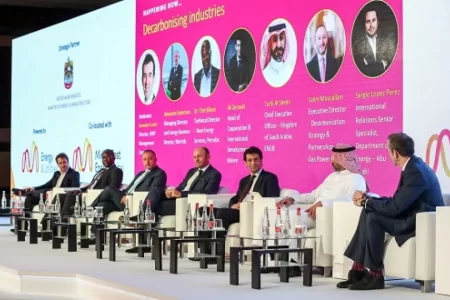Dubai, United Arab Emirates
- Energy experts confident Saudi will meet its net-zero carbon emission by 2060, if not before
- 40% of CO2 emissions from around the world come from power generation; however, the technology is in place to reduce this today, say experts
- Middle East Energy, live and in-person event concludes today
Decarbonising energy-intensive industries was the focus of the Global Energy and UtilitiesConference at Middle East Energy, which concludes on, Wednesday 9 March, following three days of top-level discussion from policymakers, business leaders, and industry experts from the energy industry.
The day three opening session Decarbonising industries addressed the critical need for decarbonising energy-intensive industries to successfully meet carbon reduction programmes and net-zero targets, with the UAE alone, expected to require new investments of USD 164bn in clean and renewable energy sources to achieve its carbon-neutral 2050 pledge.
Discussing Saudi Arabia’s net – zero target announced in October last year when the country committed to cutting carbon emissions to zero by 2060, Turki Al Shehri, Chief Executive Officer – Kingdom of Saudi Arabia, engie, reiterated his confidence in achieving these goals, he said, “I’m optimistic because if you look at the entire value in terms of public and private companies and regulations, they are all aligned towards the net-zero objective. I believe the objective is very achievable andcouldbe achieved in advance with the way things are moving forward.”
Discussing the use of technology in the here and now and the opportunities to decarbonise already available to many, Salim Mousallam, Executive Director – Decarbonization Strategy & Partnerships, GE Gas Power EMEA, said, “Today, 40% of CO2 emissions from around the world come from power generation so we cannot ignore that we have to do something. For power plants, there are multiple solutions to decarbonise and achieve net-zero.”
“At GE, we’ve been burning hydrogen for about 30 years, so the technology is there; however, the only issue is when you look at the energy trilemma, you need sustainability, reliability and affordability, so until you have the right economy and the infrastructure to support hydrogen, which can take years, we have to look at both pre and post-combustion. Carbon capture is critical as it is something we can do today. I think if you look at the overall picture if we have the right policies and incentives, we already have the solutions so we can start decarbonising today rather than waiting for the perfect solution in 10-15 years.”
Other speakers on the panel included Alexandre Eykerman, Managing Director and Energy Business Director, Wartsila; Dr Chet Biliyok, Technical Director-New Energy Services, Petrofac; Ali Zerouali, Head of Cooperation & International Development, Masen; and Sergio Lopez Perez, International Relations Senior Specialist, Department of Energy, Abu Dhabi.
Concluding the Intersolar Conference, energy storage and the rapid evolvementof technology took centre stage during the opening session. The discussion centred on how the market is shifting and adapting as power generation, distribution, and storage technologies open new possibilities.
A special focus group on Nigeria was attended by Engr. A.D. Abubakar, Director of Renewable & Rural Power Access Dept, Federal Ministry of Power, Nigeria, with investment high on the agenda.The high-level strategic discussion underscored the importance of understanding the market, recognising the supply chain and understanding the key players.
The county’s successin energy was also outlined and attributed to strong government policies and involvement, investment in the value chain from both the private and public sectors and million-dollar investments into transmission. However, it was also highlighted that there are still ample opportunities for further investment and growth.
Else where on the show floor Ras Al Khaimah Municipality announced the launch of the first RAK Energy Summit, which will be held under the patronage of His Highness Sheikh Saud Bin Saqr Al Qasimi, UAE Supreme Council Member and Ruler of Ras Al Khaimah.
In line with the RAK Energy Efficiency and Renewables Strategy 2040, which targets 30% electricity savings, 20% water savings and 20% renewable energy in the generation mix by 2040, the summit will bring together international and regional experts and leaders from the government and the private sector to discuss emerging trends and initiatives in the field of sustainable energy.
At the Summit, participants will discuss emerging trends in green buildings, building retrofits, efficient mobility, efficient water use and reuse, solar applications, energy from waste, and many other related topics.
In addition,French-headquartered Baudouin, manufacturers of marine and industrial and natural gas engines signed a Memorandum of Understanding (MoU) with Power Solutions International.
Middle East Energy concludes on, Wednesday 9 March, following three days of discussion focused on developing a diverse, digitised and sustainable future.





















